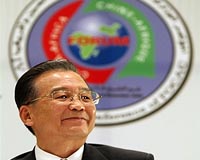| . |  |
. |
Washington (AFP) March 31, 2010 The United States voiced concern Wednesday that China has erected new hurdles to foreign innovation, in an annual report to Congress on foreign trade barriers. "A troubling trend that has emerged... is China's willingness to encourage domestic or 'indigenous' innovation at the cost of foreign innovation and technologies," said the report submitted by US Trade Representative Ron Kirk. The USTR noted the Chinese government directive issued in November requiring that a product's intellectual property (IP) must originally be registered in China to qualify as "indigenous" innovation under its accreditation system. The report cited as another example of "this broad trend" draft patent regulations released for public comment in November. "These proposed regulations have raised a number of concerns regarding their expansive scope, the feasibility of certain patent disclosure requirements, and the undermining of IP rights through possible compulsory licensing of essential patents included in national standards," it said. "If adopted in their current form, these provisions may have the unintended effect of undermining the incentives for innovation and, by discouraging rights holders from participating in the development of standards in China, depriving the standard setting process of potentially superior technology." China is currently the third-largest export market for US goods, according to the 2010 National Trade Estimate report, which outlines significant barriers to US trade and investment and the USTR office's actions to address them. Critics accuse Beijing of keeping its yuan currency undervalued to maintain an unfair trade advantage and the politically sensitive massive US goods trade deficit with China remains a sore point between the two economic powers. The gap, by far the largest with any US trading partner, narrowed to 226.8 billion dollars in 2009, down 41.2 billion from 2008. The currency debate flared anew in early March when US senators introduced legislation that would impose tough new penalties on China if it failed to revalue its currency. President Barack Obama, facing pressure to boost jobs to help support a nascent economic recovery, in February unveiled the National Export Initiative to pry open foreign markets for US exports, targeting huge emerging economies like China, India and Brazil. The initiative is aimed at doubling US exports in five years with a strategy to identify markets for fast-growing sectors such as environmental goods and services, renewable energy, healthcare and biotechnology.
Share This Article With Planet Earth
Related Links Global Trade News
 Rio trial spotlights risky China business world
Rio trial spotlights risky China business worldSydney (AFP) March 31, 2010 The high-profile Rio Tinto trial has lifted the lid on the opaque, and often risky, process of doing business in China - and become an object lesson for other foreign companies, analysts say. The heavy sentences for bribery and industrial espionage serve as a warning for firms wading into treacherous waters in the emerging giant, where "guanxi" (connections) are vital, sharp practice is com ... read more |
|
| The content herein, unless otherwise known to be public domain, are Copyright 1995-2010 - SpaceDaily. AFP and UPI Wire Stories are copyright Agence France-Presse and United Press International. ESA Portal Reports are copyright European Space Agency. All NASA sourced material is public domain. Additional copyrights may apply in whole or part to other bona fide parties. Advertising does not imply endorsement,agreement or approval of any opinions, statements or information provided by SpaceDaily on any Web page published or hosted by SpaceDaily. Privacy Statement |